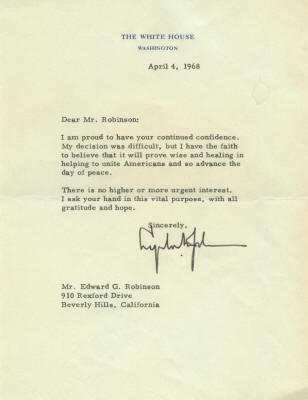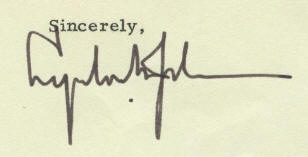910302
Lyndon B. Johnson
Click on image for larger size
Lyndon Baines Johnson, 1908-1973. 36th President of the United States, 1963-1969. Superb Typed Letter Signed, Lyndon B. Johnson, one page, 6¾" x 8¾", on stationery of The White House, Washington, April 4, 1968.
On the day of the assassination of Martin Luther King, Jr., and mired in an unpopular war in Vietnam, Johnson explains to Hollywood actor Edward G. Robinson why he did not seek reelection: that his withdrawal from the race would help "to unite Americans and so advance the day of peace." In full:
“I am proud to have your continued confidence. My decision was difficult, but I have the faith to believe that it will prove wise and healing in helping to unite Americans and so advance the day of peace. / There is no higher or more urgent interest. I ask your hand in this vital purpose, with all gratitude and hope."
The turbulence in American society in the 1960s was due primarily to two causes: race relations and Vietnam.
Race relations turned violent in Mississippi during the Kennedy Administration, and the United States was embarrassed overseas by television images of police and firemen turning fire hoses and German shepherds on African Americans. The country most vocal about championing liberty, struggling with the Soviets to keep West Berlin free and to protect western Europe, nevertheless was mistreating its own people.
Johnson inherited not only the civil rights problem but the situation in Vietnam, whose leader, Ngo Dinh Diem, was assassinated in a coup encouraged by the Kennedy Administration just a couple of weeks before Kennedy was himself assassinated. Since his hero, Franklin D. Roosevelt, had won World War II, Johnson had to make sure that he won in Vietnam. As a result, in about five years he sent over half a million more combat troops to Vietnam, causing violent protests.
Protests over Vietnam were bad enough that Johnson, who won by an absolute landslide in 1964, realized that he could not be reelected in 1968, especially after Eugene McCarthy showed very well against him in the New Hampshire primary. In his memoirs, The Vantage Point, Johnson insisted that he decided long before that he would not seek reelection. But one can imagine what went through his mind, with all his ego on the line, as he finally announced that he would not be a candidate—especially because Robert F. Kennedy, whom he detested, was poised to become one.
Undoubtedly Johnson, paranoid about the Kennedys, could not have accepted a loss to RFK. Then King was shot, once again inflaming race relations.
It was in this state of affairs that Johnson wrote this letter. Two months later RFK was assassinated. Vice President Hubert Humphrey thus received the Democratic presidential nomination, but he so split with Johnson over Vietnam that in later campaign appearances he removed the vice presidential seal from the podium. Alabama Governor George Wallace, the erstwhile racist, split the Democratic vote, giving Richard Nixon the election on a promise of peace with honor in Vietnam.
This letter, with the salient date of April 4, brings all of this together—the war, King's assassination, and Johnson's statement that peace is the most urgent need of the time, a need that his own candidacy could not fulfill. Given LBJ's ego, this letter contains a virtually unbelievable concession.
The letter has one normal mailing fold, which does not affect the signature, and a faint stain at the upper right and faint toning at the right edge, both of which are more apparent in the scan than on the piece itself. Johnson has signed boldly in black. Overall the piece is fine to very fine.
Unframed.
_____________
This item has been sold, but
click here to see other
Presidents and First Ladies items
that we are offering.
|

